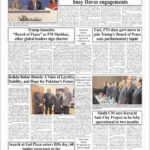By. MUHAMMAD IRFAN SIDDIQUI
A Bond Forged in the Fires of History
The relationship between Pakistan and Japan was born from extraordinary circumstances. In the wake of World War II, as Japan emerged from devastation, Pakistan extended a hand of friendship. In 1952, Pakistan waived war reparations and ratified the Treaty of San Francisco, becoming one of the first countries to support Japan’s reintegration into the international community. Pakistan even sent vital food and textile materials during Japan’s reconstruction. These acts of solidarity laid the foundation for a diplomatic relationship rooted in mutual respect and historical empathy.


Over the decades, this friendship evolved into one of Asia’s most consistent and quietly productive partnerships. Japan became a major development partner, contributing billions of yen in Official Development Assistance (ODA), helping Pakistan build roads, tunnels, dams, power stations, hospitals, and schools. From the Kohat Tunnel to the Indus Highway, and from Jamshoro Thermal Power Station to health-sector revitalization, Japan’s contributions have touched millions of Pakistani lives.
A New Chapter Begins: Enter Ambassador Akamatsu Shuichi
In November 2024, a new chapter began with the appointment of H.E. Mr. Akamatsu Shuichi as Japan’s Ambassador to Pakistan. A seasoned diplomat with more than three decades of international service across China, the UK, the US, and Southeast Asia, Ambassador Akamatsu arrived in Islamabad with a clear mission: to rejuvenate a time-tested partnership with fresh energy and a people-first approach.
Within weeks of his arrival, he began meeting key government officials and stakeholders. His New Year message highlighted the 70th anniversary of Japan’s ODA to Pakistan and pledged to deepen cultural, economic, and human resource exchanges. His leadership emphasized continuity with innovation—drawing from a long legacy of goodwill while expanding the scope of engagement to the digital age, youth empowerment, and skills development.

Development with Dignity: Japan’s Enduring Support through ODA
Under Ambassador Akamatsu’s stewardship, Japan’s ODA to Pakistan has not only continued but expanded with renewed focus on sustainability and local empowerment. Through JICA and other implementing partners, Japan has supported critical projects in healthcare (like blood banks and ICU systems), education (such as school infrastructure in rural Sindh), and community welfare (such as thalassemia centers in Karachi).
Notably, through the Grant Assistance for Grassroots Human Security Projects (GGP), Japan has directly improved lives at the community level. Whether it’s building classrooms for underserved children or funding life-saving medical equipment, these grants embody Japan’s belief in helping others “not just by giving fish, but by teaching how to fish”—a principle repeatedly emphasized by Ambassador Akamatsu.
In his words:
“The essence of our cooperation lies in empowering people. This is how we build not only infrastructure, but hope.”
Human Resource Diplomacy: Building Bridges through Talent
One of the most visionary areas of Ambassador Akamatsu’s work has been his emphasis on human resource development. In May 2025, he convened the Pakistan–Japan Human Resources Stakeholders Meeting, bringing together ministers, government agencies, NGOs, and private firms. The focus was clear: how to train, place, and protect Pakistani workers in Japan—especially in sectors like IT, healthcare, agriculture, and manufacturing.

Ambassador Akamatsu strongly believes that the movement of skilled professionals is not just labor export—it’s a bilateral investment in shared prosperity. He envisions a future where young Pakistanis gain global experience in Japan and return with skills, values, and networks that uplift Pakistan’s economy and enrich Japanese society with cultural diversity.
This strategic approach also aligns with Japan’s demographic needs and Pakistan’s youth dividend, creating a natural synergy for mutual benefit.
Cultural Diplomacy in Action: From Ikebana to Expo 2025
Ambassador Akamatsu has brought new life to cultural diplomacy as a tool for mutual understanding. From inaugurating art exhibitions in Islamabad to promoting Japanese traditional dance and bonsai art at national events, his efforts have made Japanese culture more accessible and admired across Pakistani society.
The celebration of His Majesty Emperor Naruhito’s 65th birthday in February 2025 stood out as a major highlight. Featuring Japanese drumming, folk performances, and food stalls, the reception was not just a diplomatic event—it was a celebration of shared culture and trust.
Moreover, Ambassador Akamatsu is leading efforts to ensure Pakistan has a strong presence at Expo 2025 in Osaka–Kansai, viewing it as an opportunity for Pakistan to showcase its heritage, trade potential, and tourism appeal to a global Japanese audience.

A Future Rooted in Shared Values
Looking ahead, the trajectory of Pakistan–Japan relations under Ambassador Akamatsu’s guidance is promising and dynamic. Here’s what the future holds:
• Expanded ODA Projects focused on climate resilience, clean energy, women’s empowerment, and vocational education.
• Workforce Exchange Programs that empower Pakistanis with global careers and bring remittances and skills back home.
• Increased Japanese Investment in Pakistan’s startup ecosystem, green technology, and industrial modernization.
• Joint Academic and Youth Platforms for students, scholars, and language learners to engage meaningfully.
• Public Diplomacy Campaigns that continue to tell the story of a friendship that began in hardship but now flourishes in peace.
Ambassador Akamatsu’s diplomacy is less about state-to-state rituals and more about human connection. His outreach to students, artists, workers, and NGOs shows that Japan’s mission in Pakistan is not transactional, but transformational.
Conclusion: A Friendship Evolving, A Future Emerging
As the world reconfigures alliances in the 21st century, the Pakistan–Japan relationship remains grounded in history, strengthened by development, and renewed through people. From the rice shipments of 1952 to the digital exchanges of 2025, the journey has been extraordinary.
Ambassador Akamatsu Shuichi, with his thoughtful leadership, soft-spoken dignity, and bold ideas, is redefining what this friendship can mean in the years to come. Under his tenure, Pakistanis are not just receiving assistance—they are being seen, respected, trained, and uplifted.
And that, perhaps, is the greatest gift of diplomacy: turning goodwill into opportunity, respect into partnership, and shared values into shared futures.
















